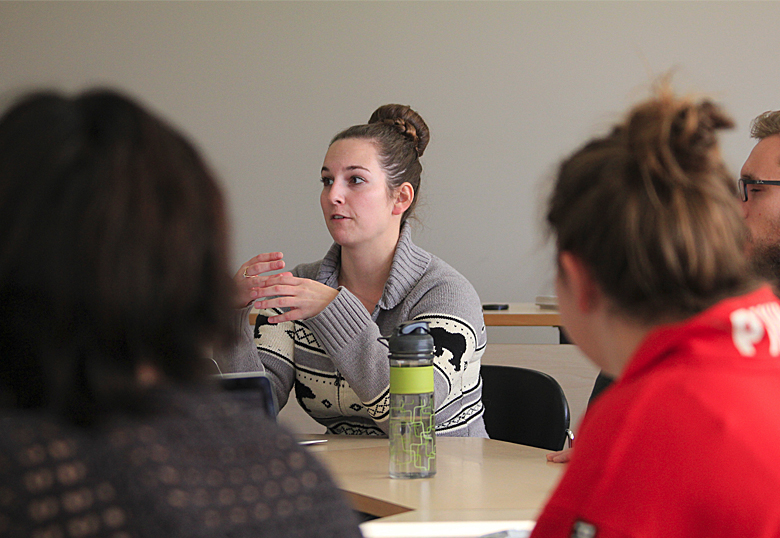Students enrolled in Dr. Jennifer Mather’s Psychology 4550 class took their learning outside the classroom with a unique project to understand the nature of community for people with schizophrenia.
“The purpose of the assignment was to get a better understanding of what it’s like to be a person with schizophrenia in the community and also to understand how other people, who have limited knowledge of schizophrenia, see schizophrenia,” says Krista Matthews, a student in the class and project leader.
The class designed the project and determined a plan of action. They first hosted a pizza lunch at the Schizophrenia Society of Alberta’s (SSA) Lethbridge offices. They met with several members of the society, including people with schizophrenia and family members, to ask them about their experiences in the community.

“It was an excellent opportunity for everyone. The clients here love talking to people and they like to reduce stigma. They were very candid in their responses,” says Megan Karg, branch program co-ordinator at SSA, Lethbridge branch. “The students had great questions and I think the conversation increased the understanding of mental illness in general.”
Matthews says the students came away with a fuller understanding of the lived experience of people with schizophrenia and what it’s like for family.
“Lethbridge seems to be a pretty good community for resources for people with schizophrenia,” she says. “We found out how the community has treated people with schizophrenia and how they can improve. Coming from the parents, we learned that it is difficult in the beginning when a family member is first diagnosed with schizophrenia because there isn’t a lot of information and there aren’t a lot of resources until you plug yourself in.”
Students then spoke to representatives of various community agencies. Some students talked to co-workers; others spoke to members of service organizations that provide transportation, housing and recreation for people with schizophrenia. Matthews spoke to a police officer.
“We found out that everyone needs to be educated on people with schizophrenia. We need to get rid of the stigma,” she says. “We need to start at the schools, junior high and high school, and educate students. School children are very understanding about kids with Down syndrome or a condition that’s more visible, but illnesses like schizophrenia and bipolar disorder are invisible. People don’t understand and thus starts stigma.”
Media can foment stigma, too, depending on the way they portray mental illness in movies and television.
Matthews says the local crisis team is instrumental in caring for people with psychological issues but she also sees a need for advocacy.

“We shouldn’t really need advocates, that’s the problem. We should have a health care system that sees the need instead of just brushing people off. I think the big education needs to start with emergency responders,” she says.
Even though the stigma has decreased over the years, Karg agrees that more education is needed. The SSA offers workshops in the community where clients talk about their illness and how it affects their life.
“It’s putting a face to a name and it’s very powerful,” says Karg.
As a learning exercise, Matthews says she and her classmates enjoyed the experience and were motivated to complete the project even though they weren’t graded on it.
Mather is a long-time proponent of having her students see for themselves how their learning in the classroom plays out in real life and the class project accomplished that goal.
“I have sponsored more than 100 Applied Study students and I am a firm believer in combining academic learning with real-world contact,” she says.
“With this project, we probably learned the most we have learned in class,” says Matthews. “We’ve had presentations throughout the semester but, in those, we’re just sitting and listening. In this project, there was active involvement where we actually got out and spoke to people and did personal research. I think you learn a lot more that way.”
